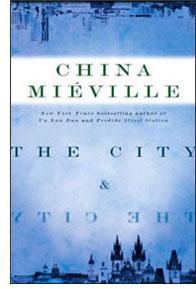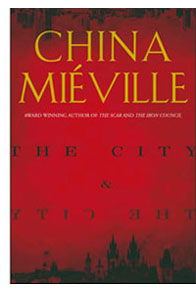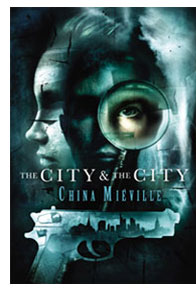 |
 |
06-05-09 :
Douglas Clegg Takes the Vanguard With Isis : Small Big Press, Big Small Book
Returning from my road trip, I found stacks of books on the dining room table. I ripped open the envelopes without really paying attention, and came upon a very interesting artifact form one of my favorite horror writers, Douglas Clegg. The guy who's writing this is the sort of fellow who treasures his Pocket Books paperback original of 'Goat Dance.'
Clegg's been a busy guy in the intervening years, and doing a lot of work with independent presses I really admire; on the shelf underneath 'Goat Dance', I have the Cemetery Dance edition of 'You Come When I Call You.' So when I went to go through the spoils of two day's absence, I found these cool little Douglas Clegg novellas, looking to be illustrated by Glen Chadbourne and simply assumed that it was another independent press release that I'd been super fortunate to get. But then I looked closer.
'Isis' (Vanguard Press / Perseus Books ; October 2009 ; $15.95) is from Perseus, which I know to be the home of Basic Books, and other fine political fare. And Vanguard itself seems like a totally normal mainstream publisher. Are these guys finally getting a clue? Vanguard/Perseus, for all that I admire their work, are not the first and frankly, much closer to the last people I'd expect to publish this sort of work in this sort of format. The playing field just got a lot more complicated. Smallish big presses are grabbing the sort of material and producing the sort of books that were once the domain of the biggish small presses. The upshot is that we have hopes of seeing more good books; a win-win situation.
If 'Isis' is any indication, then Vanguard Press are up to some seriously great work. The story is classic Clegg. Isis Villiers and her family are moved to Belerion Hall to take care of an ailing grandfather. She's warned to stay out of the stone-hedged field. But tragedies happen and they beget bad decisions as well as further tragedies — but good stories! Isis, of course, will grow up to become Isis Claviger, the seer of The Hudson River Academy, slotting this title into Clegg's Harrow series.
Clegg's strengths — his vivid characterizations, superb sense of place and hallucinatory prose — are quite well in evidence here in the short form. They totally enhanced by the package that Vanguard is giving readers, which I hope will sell like hotcakes to beget not further tragedy but more books in this format. There are lots of lovely line drawings by Glen Chadbourne, including the incredible cover. The printing is generous to the reader, with a small format but nice print. This is a book that will be a total pleasure to read and re-read.
|
|
 |
 |
The Random House US version of Miéville's latest, actually not the true first edition |
 |
 |
The Pan Macmillan UK version, the "true first edition" by 11 days |
 |
 |
The Subterranean Press Limited edition, cover art by Vincent Chong, printed in two colors |
06-04-09 :
China Miéville Resides in 'The City & The City' : A Hard-Boiled Imagination
Imagination and invention create the worlds we love to explore as readers. The imagination is usually associated with the extremes of its abilities, and few have better explored those extremes than China Miéville. His Bas-Lag novels ('Perdido Street Station,' 'The Scar' and 'Iron Council' are amongst the finest works of the imagination in recent literary history, rich with invention, imagination, the baroque and bizarre
I suppose that grotesque is the word I'm looking for with regard to both the imagination in general and China Miéville in particular. Or better still, monsterific. He creates outlandish worlds and populates them with critters I just love and love and love.
But the imagination and invention are not restricted to the grotesque, either in general or in the specific case of China Miéville. It takes merely a shift of perception to regard even the most everyday sights as bizarre, and Miéville displays his writerly skills in so doing with 'The City &
The City' (Pan Macmillan UK ; May 22, 2009 £17.99 ; Del Rey / Random House ; May 26, 2009 ; $26 ; Subterranean Press ; July 2009 ; $75). To my mind, the less said about the plot of this book, the better. You'll want to experience it as cold as you can going in. Suffice it to say that it starts as a hard-boiled detective story set in the city of Bezel, somewhere in Europe, with a murder. Then it goes elsewhere.
With 'The City & The City,' Miéville demonstrates that one need not use the grotesque to channel a vivid imagination. Instead, Miéville uses his skills to get us to regard the mundane city and suburban streets we walk on every day as facets of our imagination. He challenges us in this novel, to re-imagine the everyday as the fantastic, to use our imaginations to re-build the world around us into something strange and unique, something we have literally never seen before, because we are not this time seeing; we are imagining. Solving a murder is rarely a task for philosophers, but this time around, we're asked to deal with, for want of a better term, forensic metaphysics. Having imagined such a task in the first place, it's not surprising that Miéville can pull it off with such ease.
Alert, that is to say, compulsive, readers will have noted with slavering delight that there are three, count 'em three editions of this book, with even Subterranean's limited going for a paltry $75. I consider four to be something of a lucky number, so having the opportunity to buy four copies — three to keep and one to read, is a boon to this reader. It's relatively short — just north of 300 pages — so it won’t take up as much shelf space as it probably deserves. Dont be surprised if you shelve four copies but only see one sat a time, with the others showing up in rotation. It's not gremlins, it's your imagination, rebuilding your mundane world into something just a little bit more magical.
|
|
06-03-09 :
For Richard Cytowic, M. D. and David M. Eagleman, M. D. 'Wednesday is Indigo Blue' : 'Discovering the Brain of Synesthesia'
There's almost certainly a neurological reason why I like reading about neurology. I can imagine that in the folds of my brain, neurons fire in a particularly pleasing manner as they read about themselves. And I've been doing this sort of reading for a long time, ever since I first found a book titled 'The Man Who Tasted Shapes' by Richard Cytowic, M. D. I knew right off the bat that wanted to read a book about synesthesia.
I guess it was some fifteen or so years ago when I encountered 'The Man Who Tasted Shapes' and a peculiar brain disorder called synesthesia. Cytowic's original chronicle of that small percentage of humanity who experience "joined sensation" was a compelling glimpse into both the perception of the world and the perception of mental disorders. Now he's back with, well, fifteen years of technology and co-author David Eagleman, the man who wrote 'Sum'. The result is 'Wednesday is Indigo Blue: Discovering the Brain of Synesthesia' (The MIT Press ; April 24, 2009 ; $29.95) a beautifully produced and gripping book that looks at synesthesia with the help of 21st century neuroscience and genetics. Not surprisingly, their work explores not just the nature of synesthesia, but the problems of perception, of how we apprehend our world. We're just one brain scan away from philosophy.
In 'Wednesday is Indigo Blue', Cytowic and Eagleman look at Cytowic's pioneering work in synesthesia and extend that work with the help of technology that allows us to see what's happening in the brain. They write well together and gradually lead the reader into the very bizarre world of synesthetes. This is gripping, exciting science; a look at the world as hallucination, in a sense. But when they go beyond, into matters of creativity and art, autism and genetics, that's when the readers' neurons really start firing. This is a reading experience akin to swirling into a realm of dreams, where readers make connections to their own lives and experiences.
I hope that it is no surprise that a book on synesthesia is gorgeously produced and printed. There are lots of illustrations and charts that make the book easier to read because they enhance the text as well as creating a more pleasing look. But the bottom line here is that this is a book about bottom-line reality, or as it happens, the bottom line of unreality. You're immersed in unreality at this moment, as you read this. Neurons are firing, making connections. Language, so unreal, is made real.
|
|
06-02-09 :
Marjane Satrapi Versus Jim Butcher : Graphic Novels Step Up
The commercial birth of a new form doesn't happen too often and it's fascinating to witness. In our lifetime, the graphic novel has come in from the cold, to the extent that you can now see two very different but very commercial and mainstream approaches to marketing this new format. When the heavy hitters come to bat, the choices made by the publishers just might surprise you.
For example, let's take the case of Jim Butcher and Marjane Satrapi. Both are by any measure big-name, mainstream successes. Both are published by various arms of Random House; at least, as graphic novels go. Butcher hits the bestseller lists with each new installment of his 'Dresden Files' adventures. Satrapi does as well, and she received an Oscar nomination for her adaptation of her graphic novel 'Persepolis.' Butcher's novels, alas, were adapted into a mode-for-doomed-TV series on the "Syfy" — whatever the hell that means — channel. He deserved better.
And he gets it with the super-deluxe, full-color, hard-cover treatment of 'Jim Butcher: The Dresden Files : Storm Front: Volume 1: The Gathering Storm' (Dabel Brothers / Del Rey / Ballantine / Random House ; June 9, 2009 ; $22.95). No, there are no pages in this book that have fewer words than in the title! (I checked.) What you get here is pretty amazing, and seem to have required as many hands a movie; an adaptation by Mark Powers, illustration by Ardian Syaf (take that "Syfy"!), inks by Rick Ketcham (I've got to wonder if he's related to the great Hank), colors by Mohan, lettering/design by Bill Tortolini, and edited by David Lawrence. The upshot shows the result of such an effort; a tight, well-drawn, beautifully lettered graphic novel (really a novella, to my mind, but whose going to quibble?) that captures the vibe of Butcher's novels to my mind, better than the TV series managed.
But the publishers aren't just doing themselves a favor with a work like this. This here is one hell of a gateway drug for a big swathe of up-and-coming readers-to-be, who, having been hooked by this installment might well find ever-so-affordable mass market paperbacks. This is also a superb gift from the publishers to Butcher's fans, a handsomely produced impeccably-printed hardcover that should well have them drooling for more. Looking for a skin-shedding monster you can call your own? Look no further. Butcher et all deliver. Let's just hope the next film adaptation looks this good.
Meanwhile, over on the other side of the taste spectrum, we've got 'Chicken With Plums' (Pantheon / Random House ; April 14, 2009 ; $12.95), a trade paperback re-issue of a title from (it looks like) some three years ago. Satrapi needs no introduction from me. She's a brilliant artist and writer whose simple style is strikingly effective and achingly emotional. 'Chicken With Plums' is an excellent introduction, however, for the Dresden Files set. Satrapi tells the story of her great-uncle, a renowned Iranian musician who finds his tar broken — and, unable to replace it, lies down to die over the course of eight days. Satrapi's novel (ok, it’s a novella as well, I guess!) shimmers through eight days of dreams, memories and fantasies in the mind of a great artist, a loving man and a very human being. It has all the power of great literature because it is great literature. And, not surprisingly, it doesn't need a super-deluxe treatment. Satrapi take black ink and words and transforms the life and the reader. She reminds us of the power of being human.
And both of these graphic novellas remind readers that there is yet another whole realm of reading experience out there. If you approach from the text-based world as do I, you can pick these up and find something very different from pure reading, but just as pristine. And, if you're a reader of graphic novellas, you might suspect that behind the illustrations lie words. Stories. Books.
|
|
06-01-09: Mark Teppo's 'Lightbreaker' : Cracking the Codex of Souls
We all probably know someone we call a "lost soul." Our friend who deserves better and never quite gets it, the nephew or uncle who has everything but, you know, like a working car, the co-worker who makes an enormous effort but never hits the target spot-on. The lost souls in our lives; we can't help but love them. That love plays into our love of urban fantasy as well, which is about souls that are literally lost. Frankly, it sounds a bit easier to be actually disembodied than it is to be financially disenfranchised.
"Like a deer in the headlights."
It's the feeling of being out of your depth, in a situation that you can understand only enough to understand you have no understanding and no hope of control. But what happens when that deer in the headlights has a verifiably human soul, and you're on the driver's side of the equation? Who is in control then?
Lost souls are the order of the day for Landis Markham. He's back in Seattle, and the local cop, Lieutenant Pender, thinks he's a venificus — a poisonous sorcerer. When he sees the deer, he knows it's something more than a lost mammal. What it proves to be is a portent of something really, really bad, something that will challenge Markham's talents, which are considerable. After all, he bears the Chorus and the human souls therein. Markham is not someone to mess around with.
'Lightbreaker' (Night Shade Books ; May 2009 ; $7.99) is not a book to mess around with either. In case you haven’t noticed, the world is awash in urban fantasy. But Teppo's Markham is no average supernatural crime-solver, and 'Lightbreaker' is a book awash not just in the surreal, but also in the deeply researched field of magick. Yes, that's right, magick with a "k." Aleister Crowley, Iron Maidens and the stolen souls of lots of people, and I mean lots of people. Think of all that energy, all the power there. You could pull off something really nasty.
Teppo's Night Shade debut ups the ante for urban fantasy. I have to admit that Night Shade had me fooled so far as appearances go. 'Lightbreaker' (Oh Lucifer, you silly fool!) looked exactly like a Random House book. But what you’re holding in your hands in nothing less than an eight-buck first edition from an independent press, which is really quite cool.
Beyond the slick packaging however, 'Lightbreaker' delivers on great reading. It's steeped in a dense mythology the author uses to transform and subvert the mystery genre into something both tougher and more fun. Markham's a great guide to Teppo's universe, which feels appropriately Hermetic, self-sealed and internally consistent. Teppo has clearly done his research, but more importantly, he enjoyed it, and readers will get that sense of joy and exploration. And dread and terror, and tension ... with some release, though what happens when you release the soul from the body is perhaps less beneficent for both than you might imagine. And like any good book it just might change your perceptions forever, every time you hear the phrase "free soul." Freedom cuts two ways. It’s a sharp knife.
|
|
 |
|
|
|




